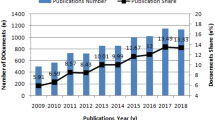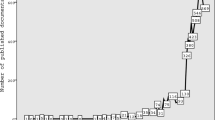Abstract
A disaster is a crisis situation that causes significant harm to humans, the environment, the economy, and impacts upon society’s ability to cope both during the event and with the aftermath. A disaster may escalate rapidly to reach unpredicted consequences. They can be naturally occurring, or man-made, or a combination of the two. In this study we have focused on the Fukushima Daiichi nuclear power plant accident of 2011 that subsequently unleashed a floodgate of scientific activities, including basic and applied research, technology development, policy reform, inter-disciplinary collaboration, citizen science and re-strategization of research networks. In this context, a bibliometric study has been conducted on 5455 publications on the Fukushima disaster indexed by Scopus for the 2011–2017 period. The aim is to identify key papers in the field, the most substantive contributors to the literature, and to begin to map out the emergence of a body of knowledge resulting from the disaster. The findings present main national and international collaborators on Fukushima disaster related research, as well as an indication of the major research themes evolving over the immediate years following the event. This allows for a deeper understanding of the longitudinal impact of a disaster on society and upon the international research community and its deliberations.






Similar content being viewed by others
References
Abdullah, N., Roffeei, S. H. M., Kamarulzaman, Y., Yusop, F. D., Madun, A., & Ng, K. H. (2015). Evaluating the performance of electromagnetic fields (EMF) research work (2003–2013). Scientometrics, 105(1), 261–278.
Abrizah, A., Zainab, A. N., Kiran, K., & Raj, R. G. (2013). LIS journals scientific impact and subject categorization: A comparison between web of science and scopus. Scientometrics, 94, 721–740.
Aitsi-Selmi, A., & Murray, V. (2016). The Chernobyl disaster and beyond: implications of the Sendai framework for disaster risk reduction 2015–2030. PLoS Medicine, 13(4), e1002017.
Bornmann, L., Thor, A., Marx, W., & Schier, H. (2016). The application of bibliometrics to research evaluation in the humanities and social sciences: An exploratory study using normalized google scholar data for the publications of a research institute. Journal of the Association for Information Science and Technology, 67(11), 2778–2789.
Countries of the World. https://www.countries-ofthe-world.com. Accessed November 25, 2017.
Ellegaard, O., & Wallin, J. A. (2015). The bibliometric analysis of scholarly production: How great is the impact? Scientometrics, 105(3), 1809–1831.
European Nuclear Society. http://www.euronuclear.org. Accessed March 25, 2018.
Gazni, A., Sugimoto, C. R., & Didegah, F. (2012). Mapping world scientific collaboration: Authors, institutions, and countries. Journal of the Association for Information Science and Technology, 63(2), 323–335.
Glänzel, W. (2012). Bibliometric methods for detecting and analysing emerging research topics. El Profesional de la Información, 21(1), 194–201.
IAEA Annual Report 2006. IAEA. http://www-pub.iaea.org/MTCD/publications/PDF/Pub1239_web.pdf. Accessed December 5, 2017.
Mryglod, O., Holovatch, Y., Kenna, R., & Berche, B. (2016). Quantifying the evolution of a scientific topic: reaction of the academic community to the Chornobyl disaster. Scientometrics, 106(3), 1151–1166.
Srinivasan, T. N., & Rethinaraj, T. G. (2013). Fukushima and thereafter: Reassessment of risks of nuclear power. Energy Policy, 52, 726–736.
Subramanyam, K. (1983). Bibliometric studies of research collaboration: A review. Journal of Information Science, 6(1), 33–38.
Upham, S., & Small, H. (2010). Emerging research fronts in science and technology: Patterns of new knowledge development. Scientometrics, 83(1), 15–38.
Wang, Q. (2018). A bibliometric model for identifying emerging research topics. Journal of the Association for Information Science and Technology, 69(2), 290–304.
Wang, Q., Chen, X., & Yi-chong, X. (2013). Accident like the Fukushima unlikely in a country with effective nuclear regulation: Literature review and proposed guidelines. Renewable and Sustainable Energy Reviews, 17, 126–146.
Wang, Q., Li, R., & He, G. (2018). Research status of nuclear power: A review. Renewable and Sustainable Energy Reviews, 90, 90–96.
Yablokov, A., Nesterenko, V., & Nesterenko, A. (2009). 15. Consequences of the Chernobyl catastrophe for public health and the environment 23 years later. Annals of the New York Academy of Sciences, 1181, 318–326.
Yanev, Y. (2013). The challenge of managing knowledge in nuclear energy development. Energy Strategy Reviews, 1(4), 282–285.
Zhang, N., Wan, S., Wang, P., Zhang, P., & Wu, Q. (2018). A bibliometric analysis of highly cited papers in the field of economics and business based on the essential science indicators database. Scientometrics, 116(2), 1039–1053.
Zhang, J., Yu, Q., Zheng, F., Long, C., Lu, Z., & Duan, Z. (2016). Comparing keywords plus of WOS and author keywords: A case study of patient adherence research. Journal of the Association for Information Science and Technology, 67(4), 967–972.
Author information
Authors and Affiliations
Corresponding author
Rights and permissions
About this article
Cite this article
Kaur, K., Ng, K.H., Kemp, R. et al. Knowledge generation in the wake of the Fukushima Daiichi nuclear power plant disaster. Scientometrics 119, 149–169 (2019). https://doi.org/10.1007/s11192-019-03024-z
Received:
Published:
Issue Date:
DOI: https://doi.org/10.1007/s11192-019-03024-z




